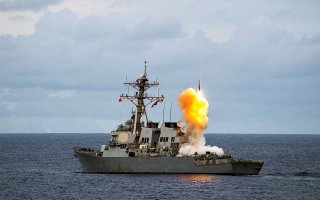5 Essential Books on Maritime Strategy You Need to Read
Admiral Lisa Franchetti, America’s chief of naval operations or top uniformed naval officer, recently released her first Navy Professional Reading List. The list is solid on the whole. There are, however, many books one could look at. Here are a few ideas.
Wayne P. Hughes Jr., Fleet Tactics, any edition.
Captain Wayne Hughes, the dean of U.S. Navy fleet tactics, traces the history of tactical development from the age of sail forward into our machine age. He divines “cornerstones” of naval warfare—“a ship’s a fool to fight a fort” being one cornerstone of particular resonance within China’s anti-access/area-denial zone—and arrives at “great constants” and “great trends” in the nautical domain. Weapons range, scouting and counter-scouting, tactics, and command-and-control are perennial themes Hughes espies.
Later editions of Fleet Tactics devote attention to littoral combat and to potentially revolutionary technologies and methods such as cyberwarfare, uncrewed vehicles, and orbital operations. The go-to work for actionable insight into fleet operations.
Edward N. Luttwak, The Political Uses of Sea Power.
Writing in the late Cold War, strategist Edward Luttwak penned this terse, incisive look at how navies contribute to peacetime strategic competition. Of particular note is his concept of “naval suasion,” meaning harnessing fleet maneuvers, port calls, and other nautical exploits short of armed conflict to cast a “shadow” across decision-making in hostile capitals—across Moscow in those days, Beijing, Moscow, and Tehran in today’s world. Casting a shadow discourages actions U.S. and allied leaders deem unacceptable. They can do nothing without factoring in what U.S. sea forces might do to balk them. An invaluable work for U.S. Navy mariners plying the seas left of bang.
Andrew S. Erickson and Ryan D. Martinson, China’s Maritime Gray Zone Operations.
Presumably someone, someday will write a theoretical work showing how coastal states deploy maritime might—not just navies but supporting military arms based on dry earth, along with not-strictly-military shipping such as fishing fleets, maritime militias, and coast guards—to make concrete geostrategic gains without openly resorting to armed conflict. Until such a treatise appears, Naval War College analysts Andrew Erickson and Ryan Martinson present an estimable substitute.
Their edited volume reviews how one such coastal state, China, has asserted control of, if not sovereignty over, maritime space without—yet—taking up arms. U.S. and allied mariners must acquaint themselves with such bizarre-seeming strategies and operations in order to comprehend and counter them. Novel methods of this type are more and more popular among coastal states intent on denying U.S. sea forces entry into marginal waters such as the South China Sea and Eastern Mediterranean—and undoing Nicholas Spykman’s rimlands strategy.
Forewarned is forearmed.
About the Author: Dr. James Holmes
Dr. James Holmes is J. C. Wylie Chair of Maritime Strategy at the Naval War College and a Distinguished Fellow at the Brute Krulak Center for Innovation & Future Warfare, Marine Corps University. The views voiced here are his alone.
All images are Creative Commons.


